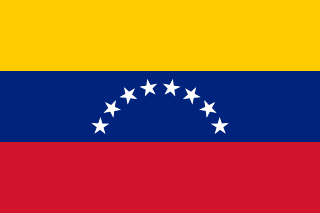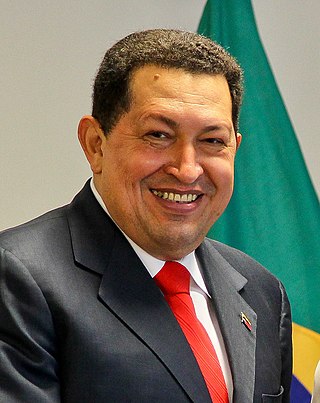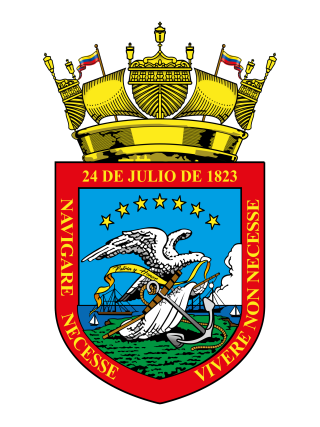
Venezuela, officially the Bolivarian Republic of Venezuela, is a country on the northern coast of South America, consisting of a continental landmass and many islands and islets in the Caribbean Sea. It has a territorial extension of 916,445 km2 (353,841 sq mi), and its population was estimated at 29 million in 2022. The capital and largest urban agglomeration is the city of Caracas.

The economy of Venezuela is based primarily on petroleum. Venezuela is the 25th largest producer of oil in the world and the 8th largest member of OPEC. Venezuela also manufactures and exports heavy industry products such as steel, aluminum, and cement. Other notable manufacturing includes electronics and automobiles as well as beverages and foodstuffs. Agriculture in Venezuela accounts for approximately 4.7% of GDP, 7.3% of the labor force and at least one-fourth of Venezuela's land area. Venezuela exports rice, corn, fish, tropical fruit, coffee, pork and beef. Venezuela has an estimated USD$14.3 trillion worth of natural resources and is not self-sufficient in most areas of agriculture. Exports accounted for 16.7% of GDP and petroleum products accounted for about 95% of those exports.

Hugo Rafael Chávez Frías was a Venezuelan politician and military officer who was president of Venezuela from 1999 until his death in 2013, except for a brief period in 2002. Chávez was also leader of the Fifth Republic Movement political party from its foundation in 1997 until 2007, when it merged with several other parties to form the United Socialist Party of Venezuela (PSUV), which he led until 2012.

Caracas, officially Santiago de León de Caracas, abbreviated as CCS, is the capital and largest city of Venezuela, and the center of the Metropolitan Region of Caracas. Caracas is located along the Guaire River in the northern part of the country, within the Caracas Valley of the Venezuelan coastal mountain range. The valley is close to the Caribbean Sea, separated from the coast by a steep 2,200-meter-high (7,200 ft) mountain range, Cerro El Ávila; to the south there are more hills and mountains. The Metropolitan Region of Caracas has an estimated population of almost 5 million inhabitants.
The bolívar[boˈliβaɾ] is the official currency of Venezuela. Named after the hero of Latin American independence Simón Bolívar, it was introduced following the monetary reform in 1879, before which the venezolano was circulating. Due to its decades-long reliance on silver and gold standards, and then on a peg to the United States dollar, it was considered among the most stable currencies and was internationally accepted until 1964, when the government decided to adopt a floating exchange rate instead.

The National Assembly is the legislature for Venezuela that was first elected in 2000. It is a unicameral body made up of a variable number of members, who were elected by a "universal, direct, personal, and secret" vote partly by direct election in state-based voting districts, and partly on a state-based party-list proportional representation system. The number of seats is constant, each state and the Capital district elected three representatives plus the result of dividing the state population by 1.1% of the total population of the country. Three seats are reserved for representatives of Venezuela's indigenous peoples and elected separately by all citizens, not just those with indigenous backgrounds. For the 2010 to 2015 the number of seats was 165. All deputies serve five-year terms. The National Assembly meets in the Federal Legislative Palace in Venezuela's capital, Caracas.

The Venezuela national football team represents Venezuela in men's international football and is controlled by the Venezuelan Football Federation (FVF), the governing body for football in Venezuela. They are nicknamed La Vinotinto. When playing at home in official games, they usually rotate between three stadiums: The Polideportivo Cachamay in Puerto Ordaz, the Estadio José Antonio Anzoátegui in Puerto La Cruz and the Estadio Pueblo Nuevo in San Cristóbal. In friendly matches, they tend to rotate between the rest of the stadiums in the country.

The Miss Venezuela is the national beauty pageant of Venezuela, traditionally held in September. It is preceded by two or three months of preliminary events, with the awarding of corporate prizes. The final televised competition generally lasts about four hours and is broadcast live across Latin America by Venevisión and produced by the networks parent company Cisneros Group, with edited versions to the United States and Mexico on the Univision and Telemundo networks. From 2013 to 2015, the national contest was split into two separate pageants: Miss Venezuela and Miss Venezuela Mundo. The pageant is also closely observed by other countries seeking to level competition due to its illustrious record of pageant victories. In 2016, the Venezuelan franchise for Miss Earth was awarded to Miss Earth Venezuela organized by National Directors Julio César Cruz and Alyz Henrich.

Arepa is a type of food made of ground maize dough stuffed with a filling, eaten in northern parts of South America since pre-Columbian times, and notable primarily in the cuisine of Venezuela and Colombia, but also present in Bolivia, Ecuador, and Panama.
Venezuelan cuisine is influenced by its European, West African, and indigenous traditions. Venezuelan cuisine varies greatly from one region to another. Food staples include corn, rice, plantains, yams, beans and several meats. Potatoes, tomatoes, onions, eggplants, squashes, spinach and zucchini are also common side dishes in the Venezuelan diet. Ají dulce and papelón are found in most recipes. Worcestershire sauce is also used frequently in stews. Venezuela is also known for having a large variety of white cheese, usually named by geographical region.

The Bolivarian Navy of Venezuela, commonly known as the Venezuelan Navy, is the naval branch of the National Bolivarian Armed Forces of Venezuela.
The Deportivo Táchira Futbol Club is a professional football club of the city of San Cristóbal, Venezuela. It was founded on January 11, 1974 by Gaetano Greco, and was originally called the San Cristobal Football Club. It is Venezuela's most popular football club.

The Captaincy General of Venezuela, also known as the Kingdom of Venezuela, was an administrative district of colonial Spain, created on September 8, 1777, through the Royal Decree of Graces of 1777, to provide more autonomy for the provinces of Venezuela, previously under the jurisdiction of the Audiencia of Santo Domingo and then the Viceroyalty of New Granada. It established a unified government in political (governorship), military, fiscal (intendancy), ecclesiastical (archdiocese) and judicial (audiencia) affairs. Its creation was part of the Bourbon Reforms and laid the groundwork for the future nation of Venezuela, in particular by orienting the province of Maracaibo towards the province of Caracas.

Nicolás Maduro Moros is a Venezuelan politician and president of Venezuela since 2013.

The history of the Jews in Venezuela dates to the middle of the 17th century, when records suggest that groups of marranos lived in Tucacas, Caracas and Maracaibo. The Jewish community, however, did not become established in Venezuela until the middle of the 19th century. Since Hugo Chávez took power in 1999, tension has existed between the government and Jewish population, which has seen large numbers emigrating. Today, the majority of Venezuelan Jews live in Israel, while modern-day Venezuela continues to host a modest Jewish population.

Relations between Cuba and Venezuela were established in 1902. The relationship deteriorated in the 1960s and Venezuela broke relations in late 1961 following the Betancourt Doctrine policy of not having ties with governments that had come to power by non-electoral means. A destabilizing factor was the Cuban support for the antigovernment guerrilla force that operates in remote rural areas. Venezuela broke off relations with Cuba after the Machurucuto invasion in 1967, when Cuban trained guerrillas landed in Venezuela seeking to recruit guerrillas and overthrow the government of Raúl Leoni. Relations were reestablished in 1974.

Venezuela first participated at the Olympic Games in 1948, and has sent athletes to compete in every Summer Olympic Games since then. Venezuela has also participated in the Winter Olympic Games since 1998. The Venezuelan Olympic Committee (COV) was created in 1935.

An ongoing socioeconomic and political crisis began in Venezuela during the presidency of Hugo Chávez and has worsened during the presidency of his successor Nicolás Maduro. It has been marked by hyperinflation, escalating starvation, disease, crime and mortality rates, resulting in massive emigration from the country.

Juan Gerardo Guaidó Márquez is a Venezuelan politician, previous member of the social-democratic Popular Will party and federal deputy to the National Assembly representing the state of Vargas. On 23 January 2019, Guaidó and the National Assembly declared that he was acting president of Venezuela, starting the Venezuelan presidential crisis by challenging Nicolás Maduro's presidency. In December 2022, opposition parties voted to dissolve the Guaidó interim government, and the dissolution occurred on 5 January 2023, ending Guaidó's presidential claim.















